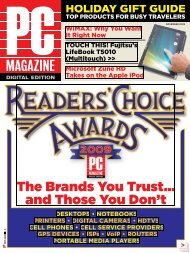PC Magazine - 2009 04.pdf - Libertad Zero - Blog
PC Magazine - 2009 04.pdf - Libertad Zero - Blog
PC Magazine - 2009 04.pdf - Libertad Zero - Blog
You also want an ePaper? Increase the reach of your titles
YUMPU automatically turns print PDFs into web optimized ePapers that Google loves.
a risk. Those two are natural enemies, like<br />
eggs and bowling balls. Facebook is simply<br />
not designed as a tool for business. If you<br />
feel that you have no choice but to dillydally<br />
on Facebook, consider these facts:<br />
• Facebook was designed by adolescents,<br />
for adolescents with adolescent<br />
goals in mind. Only a few years ago, a<br />
.edu e-mail address was a prerequisite to<br />
a Facebook account, a requirement that<br />
effectively limited membership to college<br />
students. That sensibility remains part of<br />
Facebook’s DNA. A site designed to help<br />
you publish photos of yourself barfing over<br />
a beer keg is unlikely to help burnish your<br />
reputation in business.<br />
• Facebook’s opaque user interface,<br />
the result of its fundamentally collegiate,<br />
video-gamer sensibility, is not designed<br />
to be an effective business tool. Mistakes<br />
are far easier to make and harder to correct<br />
than you’d expect in an application<br />
designed for actual work.<br />
• You can’t predict or control who will<br />
ask to “friend” you on Facebook. What do<br />
you do when your boss or an important client<br />
asks to become your Facebook friend?<br />
If your Facebook page includes the names<br />
of everyone in your witches’ coven, do you<br />
want important potential clients to see<br />
that? Or will you insult some bigwig by<br />
refusing a friend request? It’s not exactly<br />
the dilemma of the ages, but it’s certainly a<br />
potential social headache that adults need<br />
to consider when joining Facebook.<br />
• Facebook developers often spring new<br />
features on users without warning. Not<br />
long ago a new “beacon” feature tracked<br />
members’ online shopping transactions<br />
and broadcast details to the world. The<br />
feature was dialed back after a firestorm<br />
of protest as well as some huge lawsuits<br />
over privacy violations, but the impulsive<br />
sensibility of Facebook developers augurs<br />
similar surprises in the future. And it raises<br />
the creepy question of why Facebook is collecting<br />
that information in the first place.<br />
• Facebook phishing is beginning to<br />
surface. In one scenario, scammers hijack<br />
the Facebook log-in of a friend of yours and<br />
then pretend to be that friend with an urgent<br />
need for money. They contact you via chat<br />
and start the scam from there. To you, it<br />
looks like a request from a person you actually<br />
know, often embellished with personal<br />
information gleaned from your own Facebook<br />
entries. If anyone asks you for money<br />
on Facebook, use your head—don’t do it. At<br />
the very least, insist on direct contact in<br />
solutions social networking<br />
pitfalls of finding friends You can easily find out who on your contact lists<br />
are on Facebook. Think twice before adding business contacts to your network.<br />
person or via a phone call that you originate.<br />
You need to be sure that you’re dealing<br />
with a moocher you actually know, not<br />
some unknown scammer. You should also<br />
contact the FBI’s Internet Crime Complaint<br />
Center, at www.ic3.gov, to file a complaint.<br />
In some other cases, a phony Facebook<br />
friend invites you to view a video that<br />
requires you to download a player. Naturally,<br />
that player is infected with malware.<br />
Obviously, this same scam could be delivered<br />
by e-mail or ordinary Web surfing, but<br />
the familiarity of relationships on Facebook<br />
induces people to lower their guard.<br />
Don’t despair. You can maintain a reasonable<br />
level of safety on Facebook. A few<br />
common-sense precautions can reduce<br />
your risk of problems. For starters, look<br />
over your privacy settings by selecting Privacy<br />
Settings from the Settings drop-down<br />
menu in the upper right-hand corner of the<br />
screen. You can adjust every detail of your<br />
privacy settings, including who can see<br />
pictures, postings, personal information,<br />
and work information. You can also adjust<br />
what individual members see, so your boss<br />
or ex-spouse might not see things that the<br />
rest of the world does. There’s some wisdom<br />
in allowing only people you actually<br />
know to view your profile.<br />
One part of the “Find Friends” feature<br />
is a service that asks for the log-in and<br />
password of an online e-mail account such<br />
as Gmail or Yahoo; it pulls the account’s<br />
address book information into Facebook.<br />
Good sense says that you shouldn’t pull a<br />
list of business contacts into Facebook if<br />
you think there’s a risk of embarrassment.<br />
You might also consider who’s allowed<br />
to see photos that other people have tagged<br />
with your name. You may not want certain<br />
photos to be seen by certain people. It’s<br />
also possible for people to tag photos with<br />
your name that aren’t actually you, so it’s<br />
probably best to set your privacy level to<br />
limit tagged photo viewing to your friends,<br />
not the whole network.<br />
Let’s face it, Facebook is a time sink.<br />
Be prepared to spend an hour or so setting<br />
up your account when you first join.<br />
It doesn’t take that long to get an account<br />
established, but it does take some time to<br />
configure your account to make it suitable<br />
for use by a grown-up.<br />
A bit of social engineering can also help<br />
you distinguish business contacts from<br />
social friends. If an important business client<br />
wants to “friend” you, suggest that you<br />
connect on LinkedIn or one of the business<br />
networking services instead. That way you<br />
don’t have to insult someone by refusing<br />
to be a friend, and you can position your<br />
relationship as something more important<br />
than a casual encounter on Facebook.<br />
APRIL <strong>2009</strong> <strong>PC</strong> MAGAZINE DIGITAL EDITION 41







